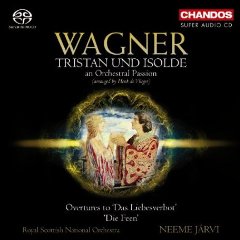Wagner - Tristan und Isolde, An Orchestra Passion (Neeme Jarvi) [2011]
Wagner - Tristan und Isolde, An Orchestra Passion (Neeme Jarvi) [2011]

1. Overture to "Das Liebesverbot" 8:22 2. Overture to "Die Feen" 10:56 Tristan und Isolde, an orchestral passion 3. Einleitung 6:41 4. Isoldes Liebesverlangen 8:12 5. Nachtgesang 15:43 6. Vorspiel und Reigen 5:31 7. Tristans Vision 4:00 8. Das Wiedersehen 5:55 9. Isoldes Liebestod 5:29 Royal Scottish National Orchestra Neeme Jarvi – conductor
The popular Prelude and the so-called Liebestod ("Mild und Leise") from Richard Wagner's music drama Tristan und Isolde are the most familiar parts orchestras play, most often in the 1859 concert arrangement by Wagner. (He preferred that the term Liebestod be applied to the Prelude only, and originally titled his concert version Liebestod und Verklärung, or "Love-death and Transfiguration.") The featured work of this Chandos SACD is the 1994 suite arranged by Henk de Vlieger, fashioned from key parts of the entire opera, not just the beginning and end. Tristan und Isolde: An Orchestral Passion is a lengthy tone poem that includes key passages, in much the same manner as de Vlieger's other symphonic syntheses on Der Ring des Nibelungen, Parsifal, and Die Meistersinger von Nürnberg. These instrumental potpourris have all been performed by the Netherlands Radio Philharmonic Orchestra, for whom de Vlieger serves double duty as arranger and percussionist, and the recordings of the first three suites with Edo de Waart show enthusiastic support and commitment to de Vlieger's work. Add to that the recordings that Neeme Järvi and the Royal Scottish National Orchestra have made of The Ring, Parsifal, and now Tristan und Isolde, and it becomes clear that there's a market for these recordings of "operas without words." Since the music is faithfully adapted from the original score, and arranged into a coherent version that still communicates the broad outlines of the drama, there is little to debate over de Vlieger's choices. Though he's not noted as a Wagnerian conductor, Järvi's interpretation is perfectly acceptable and coherent for most casual listeners' purposes. Indeed, purists who appreciate the original music dramas really have no need for this arrangement, though newcomers who are daunted by Wagner's texts and operatic singing may want to try this recording as a means to become better acquainted with one of the most influential works in western music history. This album is filled out with two of Wagner's early opera overtures, Das Liebesverbot and Die Feen. ---Blair Sanderson, Rovi
download (mp3 @320 kbs):
uploaded yandex 4shared mega mediafire solidfiles zalivalka cloudmailru oboom








